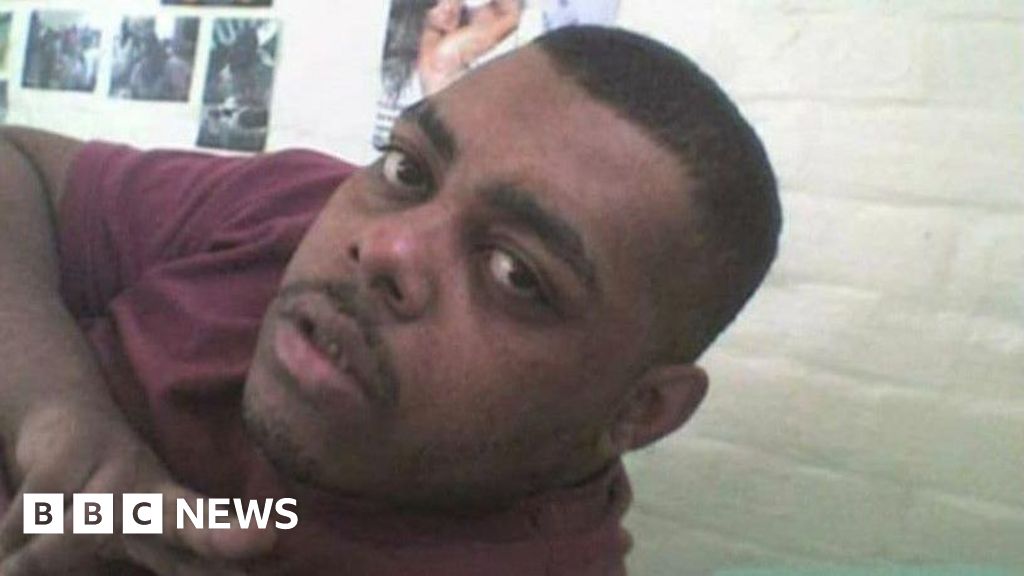Anna Lewis and
Dan MoffatBBC Wales
 Leroy Douglas
Leroy DouglasThe father of a Cardiff man who has spent 20 years in prison after stealing a mobile phone has said his son has served a “life sentence” behind bars.
Leroy Douglas, 44, was handed a minimum term of two-and-a-half years in 2005 for the theft, but remains in custody as he is subject to an indeterminate sentence of Imprisonment for Public Protection (IPP).
The controversial measure was scrapped in 2012, but campaigners are calling for those currently serving an IPP to be resentenced and have filed a case against the UK before the United Nations.
The Ministry of Justice said it released the highest annual number of IPP prisoners on record last year with additional support given to those in custody.
IPPs are a type of sentence which means inmates can be detained indefinitely if the parole board decides it is not safe to release them.
They were designed to detain offenders who posed a “significant” risk of causing serious harm to the public, but faced criticism after being handed out for less serious crimes.
Defendants must serve a minimum term before being considered for release by the parole board but this is not automatic, and are subject to licence conditions which they must follow or risk being recalled to prison once they are released.
Mr Douglas, 63, said his son was a “normal kid” growing up who was “easily led” to make bad decisions.
He said Leroy Douglas started to get into trouble along with friends and received convictions for crimes including for shoplifting as a teenager and young man.
However, he said it “all escalated” when the dad-of-two was sentenced for stealing a mobile phone belonging to his cousin’s boyfriend in 2005.
Instead of a fixed term two and a half year custody sentence, he was handed an IPP, which his family said was a “shock to everyone”.
“He got two-and-a-half years and the next thing I know is that he’s still in there all these years later,” Mr Douglas said.
“I expected him to do half of the two-and-a-half years and start fresh again.”
 Family photo
Family photoMr Douglas has not been able to make the journey to visit his son in person since he was sentenced, but speaks to him regularly on the phone.
While in custody, Leroy Douglas had to be told of his daughter’s death after she suffered a fatal brain haemorrhage aged 20, as well as losing his grandparents and other family members, something which his dad said had affected his mental health.
According to Mr Douglas he has been moved to different facilities a number of times, which has resulted in him having to repeat training and courses needed for him to be considered for release.
“We are not the only ones suffering, the whole family is with him being in prison,” he said.
Mr Douglas admitted his son had struggled with poor behaviour while in custody, but said being in a prison environment from a young age had created the “product that he is today”.
“His family is outside, so inside the only role models he’s got are those who are already in prison,” he said.
“He started to act out because he doesn’t think it’s fair that he’s been kept in there that long, so that’s had an impact on his behaviour.”
While Leroy Douglas has suffered with addiction in the past, his dad said he had tested negative for drugs while in prison.
 Natalie Douglas
Natalie DouglasAndrew Taylor, criminal barrister at Apex Chambers, has represented about 10 clients who were given IPP sentences.
He described the situation as “draconian and unfair”.
“I’ve had clients who on the face of it without IPP sentences might have faced fixed term sentences of four or five years which gives them a definite release date,” he said.
“But if you have an IPP it’s effectively for life. Many subjected to them get recalled sometimes for the most minor sentences.”
Mr Taylor said there needed to be a “large scale re-sentencing” of people who were subject to IPPs.
While he said not all those subject to them would otherwise have been released immediately, “there was no longer a need to have people locked up like this”.
“These people become hopeless, they have no hope on getting out which can lead to violent behaviour in prisons, and we have a radical shortage of prison spaces,” he said.
“The first aim of prison should be rehabilitation, and IPP sentences go against that.”
 Family handout
Family handoutFigures from June show there are about 2,500 prisoners who have either never been released or have been recalled to prison under the IPP scheme.
On Thursday campaigners from Wales, including Shirley Debono whose son Shaun Lloyd was handed an IPP sentence aged 18, went to Downing Street to hand over a letter calling for the sentences to be abolished retrospectively, and for those still affected to be re-sentenced.
The group have also filed a case against the UK government before the UN Working Group on Arbitrary Detention.
In the letter, the campaigners urged the government to “do the right thing by ending one of the greatest miscarriages of justice and restore hope and justice to thousands of IPP prisoners and their families”.
The added children had “grown up separated from their parents, not knowing when or if they will ever see them again”.
According to Ministry of Justice (MoJ) data, the number of people released from prison but living with an IPP has been cut from from 3,018 to 1,134 between December 2023 and March 2025.
A total of 602 recalled IPP prisoners were released from custody in the past 12 months, the highest number of annual releases on record.
The MoJ said: “We are determined to make progress towards safe and sustainable releases for those in prison, but not in a way that undermines public protection.”

